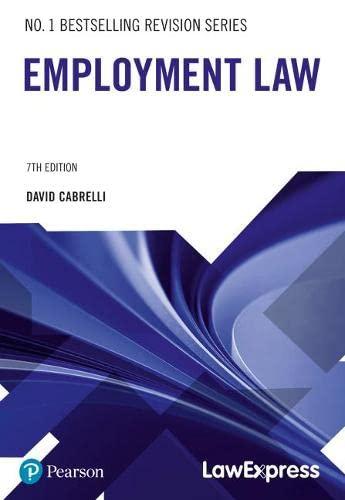Question
PLEASE ANSWER A & B AFTER READING, THANK YOU! Facts : All of us have probably accidentally pocket or butt-dialed someone with our phones at
PLEASE ANSWER A & B AFTER READING, THANK YOU!
Facts: All of us have probably accidentally "pocket" or "butt-dialed" someone with our phones at least once. It can be embarrassing for the caller, but usually nothing more than that. Rarely, a pocket-dialed call can raise serious legal and financial issues, as the following case illustrates.
James Smith was the chairman of the Board of Directors of General Atomics, an A.I. and robotics company. While at a conference in Italy with his wife and a colleague named Kevin Packard, Smith used his iPhone to call Carol Jones for help making dinner reservations. Jones, who was the executive assistant to General Atomics' CEO, did not answer, so Smith hung up and put his iPhone in his rear pants pocket.
Later, Smith and Packard walked to an empty outdoor hotel balcony to discuss personnel matters at General Atomics, including the possible firing of the CEO. During this conversation, Smith sat on a balcony chair in such a way that caused his iPhone to inadvertently redial that last called number, which happened to be Jones's office phone. When Jones answered, she quickly realized that the call was unintentional but she continued to listen anyway because the conversation involved her boss.
Concerned that Smith and Packard were plotting to fire her employer, Jones put her office phone on speaker mode and used her iPhone to record Smith's call. For one hour and thirty-one minutes, Jones listened, recorded, and transcribed the conversation. Her iPhone first captured Smith's discussion with Packard and, later, his personal conversations with his wife in their hotel room. Eventually, Smith's iPhone disconnected the call.
Jones typed up her notes, hired a company to improve the quality of the iPhone recording, and shared the resulting information with other Board members and her boss, the CEO of General Atomics.
Smith then sued Jones under the federal Wiretap Act and Electronic Communications Privacy Act (ECPA), alleging that she violated his privacy when she intentionally intercepted and disclosed his confidential communications. The district court entered summary judgment for Jones, reasoning that Smith did not have a reasonable expectation of privacy in his pocket-dialed call, and therefore the Wiretap Act did not apply. Smith appealed.
Argument for Smith: To demonstrate a reasonable expectation of privacy, Smith must first show that he had an actual expectation of privacy and, second, he must prove that his expectation was reasonable. Smith and Packard walked to an empty outdoor balcony to make sure their conversation was not overheard. Seeing no one within earshot, they had an actual expectation that their conversation was private. The defendant suggests that, because Smith knew his iPhone was capable of pocket-dialing, his expectation was not reasonable. If this view were true, no one in modern society could ever expect privacy when carrying a smart phone on them, unless it was powered off. Most people never give a second thought to turning off their phones to ensure privacy and it is ridiculous to assert that they should.
Argument for Jones: James Smith's statements do not qualify for Wiretap Act protection because he did not have a reasonable expectation of privacy. The question is not what Smith thought, assumed, or wanted - it is whether it was reasonable for him to believe he was entitled to complete privacy under the circumstances. Smith knew his phone was capable of pocket-dialing because it had done so before and he admitted so during a deposition with Jones's lawyers. Nevertheless, he took no precautions to safeguard against this foreseeable event. He could have locked his phone or powered it down, or moved it out of his back pocket to ensure it was not placing a call. His own carelessness exposed his conversation to Jones. If a person inadvertently undresses in front of an uncovered window, he cannot later claim that he deserved privacy when a passerby takes his picture. The same concept applies here. Furthermore, the Wiretap Act covers interceptedcommunications. Here, Smith called Jones. Jones intercepted nothing. She was the innocent recipient of a misplaced call. There is no law that requires a person to hang up when they receive such a call and nothing that forbids them from recording it under these circumstances.
You Be the Judge:
A. Discuss whether, under the facts provided above, Smith had a reasonable expectation of privacy in his pocket-dialed conversation. Keep in mind that Smith is not suing for the tort of invasion or privacy, but rather only alleging that Jones violated the Wiretap Act.
B. Based on your reading of this chapter of your textbook, explain whether you believe Smith or Jones has the better argument and state why you believe so.
PLEASE ANSWER A & B AFTER READING, THANK YOU!
Step by Step Solution
There are 3 Steps involved in it
Step: 1

Get Instant Access to Expert-Tailored Solutions
See step-by-step solutions with expert insights and AI powered tools for academic success
Step: 2

Step: 3

Ace Your Homework with AI
Get the answers you need in no time with our AI-driven, step-by-step assistance
Get Started


